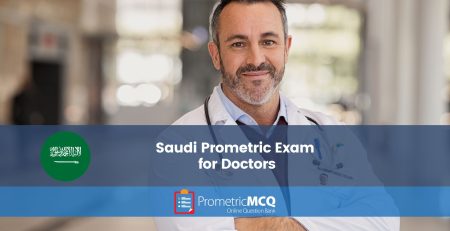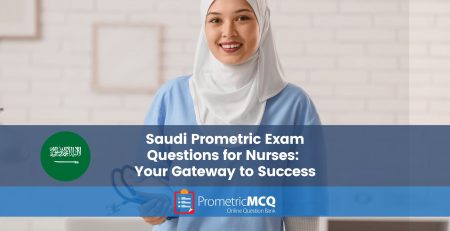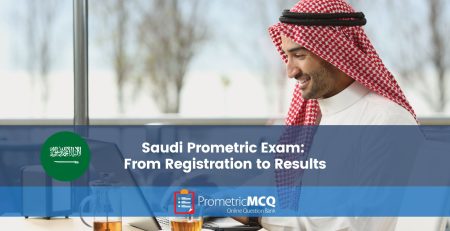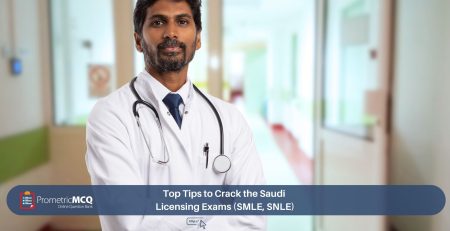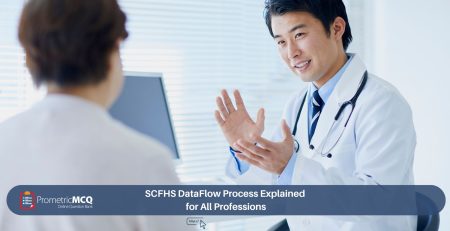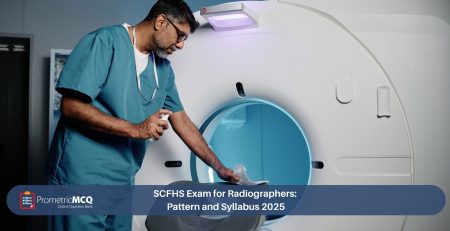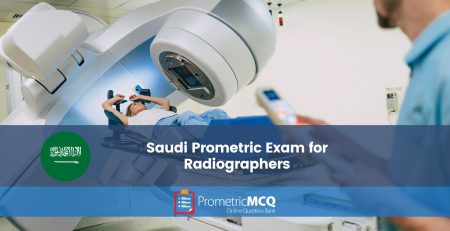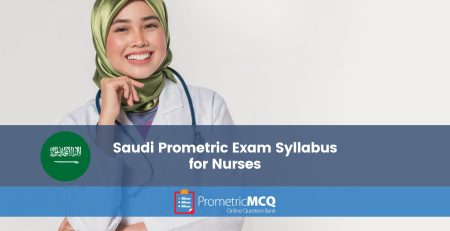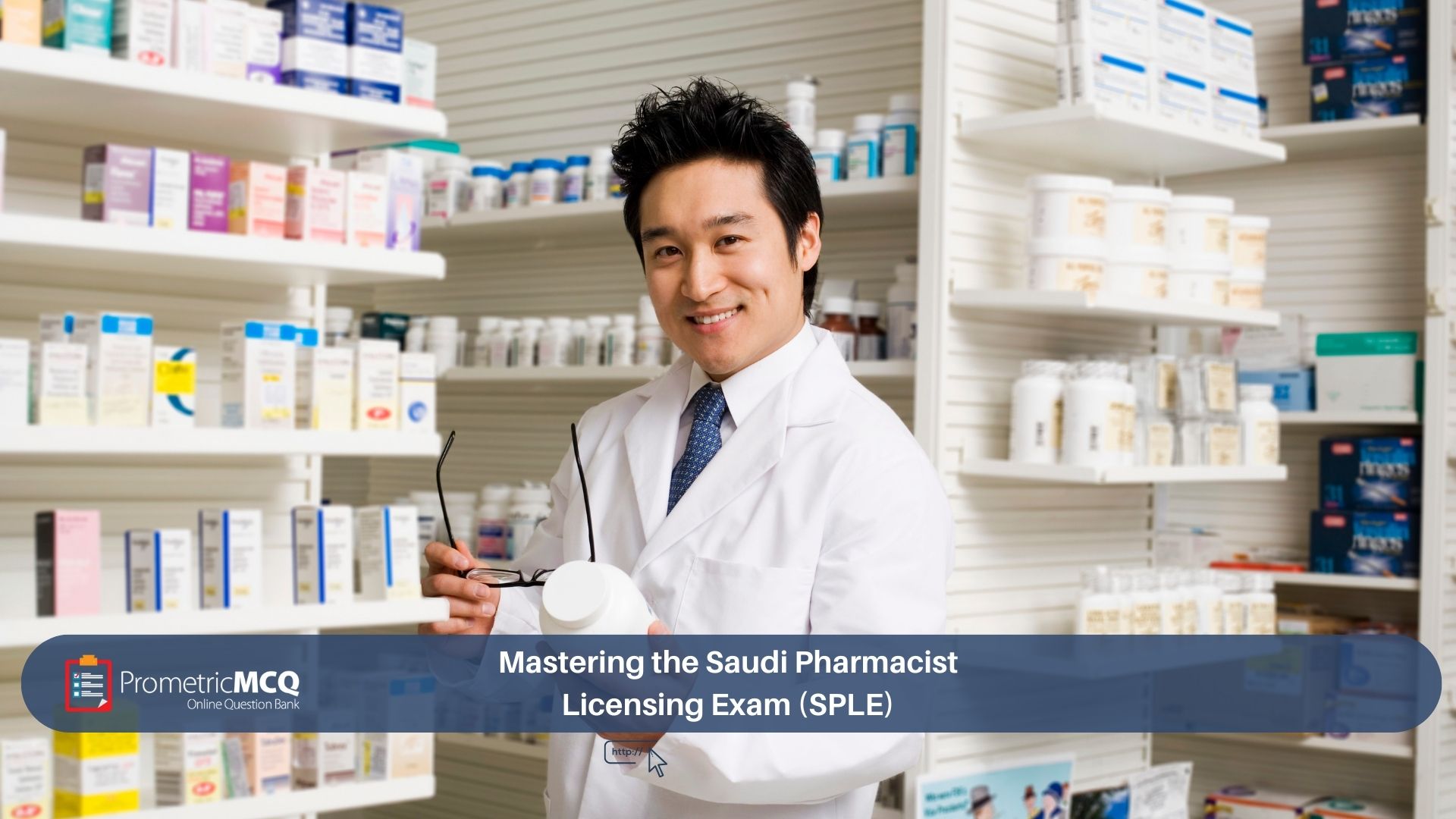
Mastering the Saudi Pharmacist Licensing Exam (SPLE)
fatima@prometricmcq.com2025-09-17T21:18:30+00:00Table of Contents
ToggleMastering the Saudi Pharmacist Licensing Exam (SPLE) (2025)
The role of the pharmacist in the Kingdom of Saudi Arabia is evolving at an unprecedented pace. As a key pillar of the nation’s Vision 2030, the healthcare sector is demanding a higher level of clinical expertise, patient counseling, and pharmaceutical care than ever before. The Saudi Pharmacist Licensing Exam (SPLE), administered by the Saudi Commission for Health Specialties (SCFHS), is the rigorous benchmark that ensures every practicing pharmacist meets these elevated standards. It is the definitive gateway to a professional pharmacy career in the Kingdom.
The SPLE is far more than a test of academic recall. It is a comprehensive, six-hour marathon that assesses your ability to integrate knowledge from multiple domains—from pharmacology to pharmaceutics to patient care—and apply it to real-world clinical scenarios. Success is not achieved by passively reading textbooks but by actively engaging in problem-solving and mastering the art of the Multiple-Choice Question (MCQ). The exam is designed to test your critical thinking, your precision in calculations, and your understanding of both international standards and local regulations.
This ultimate 2025 guide is your roadmap to mastering the SPLE. We will dissect the official exam blueprint, providing a deep dive into the highest-yield topics and their relative weightage. This guide offers a strategic study plan, realistic sample questions with expert-level rationales, and a comprehensive 10-point FAQ section to clarify every step of the process. Prepare to transform your anxiety into confidence and walk into the Prometric center ready to excel.
Key Takeaways for SPLE Mastery
- Calculations are King: Pharmaceutical calculations are a significant and high-stakes portion of the exam. You must achieve near-perfect accuracy. Practice daily.
- Master Clinical Scenarios: The exam is heavily case-based. You must be able to read a patient case, identify drug-related problems, and recommend appropriate therapeutic interventions.
- Saudi Law is Not Optional: A dedicated portion of the exam covers KSA pharmacy laws and ethics. This is easy marks if prepared, and guaranteed failure if ignored.
- Brand & Generic Names: You must be familiar with both the generic (scientific) and the common brand names of drugs marketed in Saudi Arabia.
- A QBank is Your #1 Tool: The single most effective way to prepare is by using a high-quality, SPLE-specific question bank. For a complete overview of the process, start with our guide to the Saudi Pharmacist Licensure Examination (SPLE).
Deconstructing the Official SPLE Blueprint for 2025
The SPLE is a formidable exam. It consists of 300 MCQs administered in two separate parts, each 3 hours long with 150 questions. Understanding the official content distribution published by the SCFHS is the first step in creating an efficient study plan.
| Official SPLE Domain | Approx. Weight | High-Yield Topics and Concepts |
|---|---|---|
| Domain 1: Basic Biomedical and Pharmaceutical Sciences | ~25% | Covers foundational knowledge. Pharmacology: MOA, side effects, drug interactions of major classes. Medicinal Chemistry: Structure-activity relationships. Pharmaceutics: Dosage forms, drug delivery systems, biopharmaceutics (ADME). Pharmacognosy: Active constituents of natural products. |
| Domain 2: Pharmaceutical Care and Patient Safety | ~55% | This is the largest and most critical domain. Clinical Pharmacokinetics: Dosing adjustments. Pharmacotherapy: Case-based questions on managing chronic diseases (diabetes, hypertension, asthma, etc.). Patient Counseling: Proper use of devices (inhalers, insulin pens), identifying and managing adverse drug reactions. Toxicology: Management of common poisonings. |
| Domain 3: Pharmacy Administration and Management | ~20% | Focuses on the practical and regulatory aspects of pharmacy. Saudi Pharmacy Law & Ethics: Regulations for dispensing, controlled substances, and professional conduct. Pharmaceutical Calculations: Alligations, dilutions, dosage calculations, infusion rates. Health Economics & Management: Inventory control, pharmacoeconomics. |
Essential SPLE MCQs with In-Depth Answers
Engage with these sample questions to grasp the exam’s complexity. The real learning happens when you analyze the rationale for both the correct and incorrect options. For thousands more questions like these, a dedicated QBank for the SCFHS Pharmacist Exam is indispensable.
MCQ 1: Pharmaceutical Calculations
How many milliliters of a 2% (w/v) stock solution of potassium permanganate are needed to prepare 500 mL of a solution such that 25 mL of it diluted to 100 mL will give a 1:2000 solution?
- 25 mL
- 50 mL
- 75 mL
- 100 mL
Correct Answer: B
Rationale: This is a multi-step calculation that requires working backward.
Step 1: Find the concentration of the final diluted solution. 1:2000 means 1 g in 2000 mL. Concentration = (1 g / 2000 mL) * 100 = 0.05% (w/v).
Step 2: Find the concentration of the intermediate solution. Use the dilution formula C1V1 = C2V2. (C1) * (25 mL) = (0.05%) * (100 mL). C1 = (0.05 * 100) / 25 = 0.2%. So, the solution you prepared was 0.2% (w/v).
Step 3: Find the volume needed from the stock solution. Again, use C1V1 = C2V2. You need to prepare 500 mL of this 0.2% solution from a 2% stock solution. (2%) * (V1) = (0.2%) * (500 mL). V1 = (0.2 * 500) / 2 = 50 mL.
MCQ 2: Pharmacotherapy (Clinical Case)
A 65-year-old male with a history of type 2 diabetes, hypertension, and a previous myocardial infarction is currently taking metformin, lisinopril, and atorvastatin. His A1c is 8.5%, and his blood pressure is 135/85 mmHg. Which of the following medications would be most appropriate to add to his regimen?
- Glimepiride
- Pioglitazone
- Empagliflozin
- Sitagliptin
Correct Answer: C
Rationale: According to the latest international cardiology and diabetes guidelines, SGLT-2 inhibitors (like empagliflozin) are strongly recommended for patients with type 2 diabetes and established atherosclerotic cardiovascular disease (ASCVD), such as a previous MI. Empagliflozin has been proven in large clinical trials (like the EMPA-REG OUTCOME trial) to reduce the risk of cardiovascular death, nonfatal MI, and stroke in this patient population, in addition to its glucose-lowering effects.
Why other options are incorrect:
A: Glimepiride (a sulfonylurea) increases the risk of hypoglycemia and is generally considered weight-neutral or may cause weight gain. It does not offer cardiovascular benefits.
B: Pioglitazone (a TZD) can cause fluid retention and weight gain, and should be used with caution in patients with a history of heart failure or MI.
D: Sitagliptin (a DPP-4 inhibitor) is effective at lowering glucose and is weight-neutral, but it has not demonstrated the same robust cardiovascular benefits as SGLT-2 inhibitors in high-risk patients.
Frequently Asked Questions (FAQs) for the SPLE
The SPLE is scored out of 300, and the official passing score set by the SCFHS is 180, which is exactly 60%. However, due to the challenging nature of the exam, it is highly recommended to aim for a consistent score of 70% or higher in practice tests to ensure a safe margin for success.
The application is a multi-step online process. It starts with creating an account on the SCFHS Mumaris Plus portal, submitting your academic and professional documents for classification, completing the Primary Source Verification (PSV) with DataFlow, and finally, using your eligibility number to schedule the exam on the Prometric website. A good resource is our guide on the Saudi Prometric Exam for Pharmacists.
While the exact percentage can vary, a significant portion of Domain 3 (~20% of the total exam) is dedicated to administration, law, and ethics. You must be familiar with the regulations set by the Saudi Food and Drug Authority (SFDA) regarding drug registration, dispensing of controlled/narcotic substances, and general pharmacy practice within the Kingdom.
Both. You are expected to know the generic (INN) names of drugs as is standard internationally. However, questions may use the common brand names marketed in Saudi Arabia. It is essential to be familiar with the top 200-300 drugs by both their generic and common local trade names.
Passing the SPLE makes you eligible to be licensed. You must ensure your DataFlow (PSV) is complete and then finalize your professional classification and registration on the Mumaris Plus portal. This will lead to the issuance of your official SCFHS license, allowing you to practice.
Pharmacotherapy of chronic diseases is the most important. You will face numerous case studies on diabetes, hypertension, dyslipidemia, asthma/COPD, and infectious diseases. You must know the first-line, second-line, and alternative therapies based on current international guidelines (e.g., from the ADA, ACC/AHA).
The SCFHS provides an official exam blueprint or “content outline” which details the domains and topics covered. However, they do not provide specific study books or question banks. The blueprint is your guide to structure your studies using international reference texts and high-quality practice question banks.
Candidates are typically allowed three attempts to pass the SPLE. If a candidate is unsuccessful after three attempts, they may be required by the SCFHS to undergo a specific period of training or re-education before being granted eligibility for a fourth attempt.
The most authoritative source is the official Saudi Food and Drug Authority (SFDA) website. It contains information on registered drugs, safety circulars, and the regulations that form the basis of the pharmacy law questions on the exam.
The cornerstone of a successful SPLE preparation is practicing with a large volume of high-quality MCQs that mirror the real exam’s format and difficulty. A comprehensive QBank with detailed rationales, calculation questions, and clinical cases is essential. You can find a dedicated and continuously updated resource at SCFHS Pharmacist Exam MCQs.
Conclusion: Your Future as a Licensed Pharmacist in Saudi Arabia
The Saudi Pharmacist Licensing Exam is a demanding but fair assessment of the skills required to be a competent pharmacist in the Kingdom. Success is not a matter of chance; it is the direct result of a strategic, disciplined, and practice-oriented preparation plan. By focusing on the high-yield domains, relentlessly practicing calculations, mastering clinical case studies, and understanding the local laws, you can approach the SPLE with confidence. This exam is your gateway to joining a respected and rapidly advancing profession in one of the world’s most dynamic healthcare systems.
Ready to Compound Your Knowledge into Success?
Our premium SCFHS Pharmacist QBank is your complete study solution, offering thousands of high-yield MCQs, detailed expert rationales, calculation drills, and full-length mock exams to ensure you pass with confidence on your first attempt.


